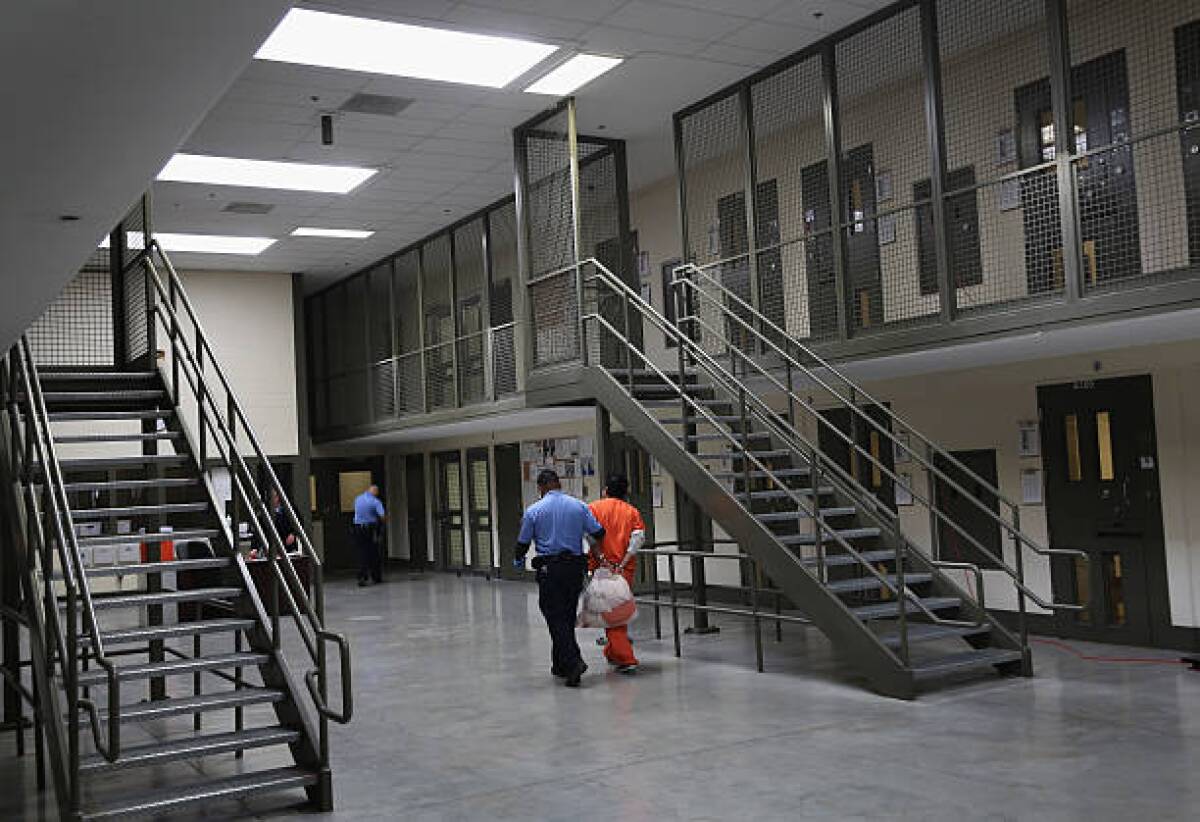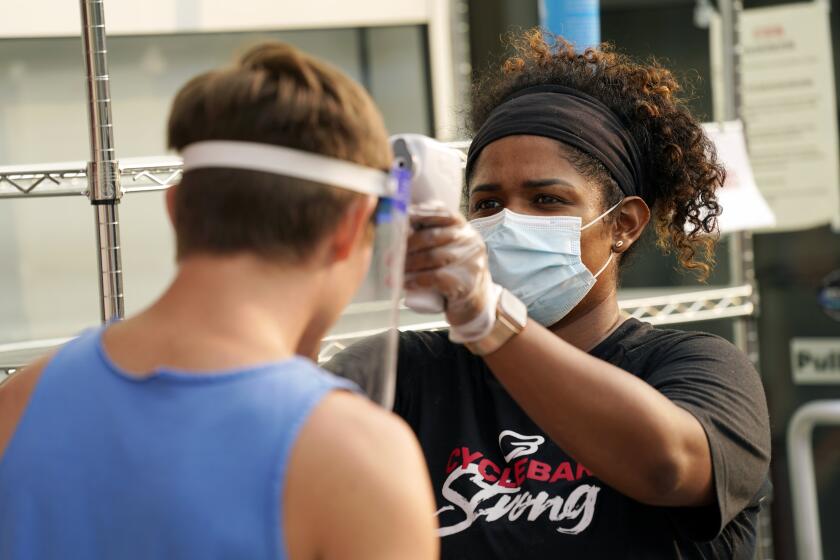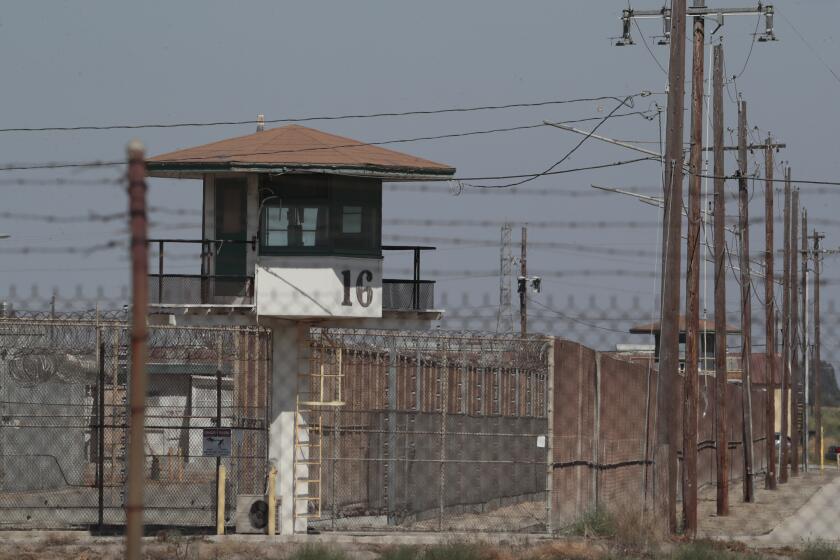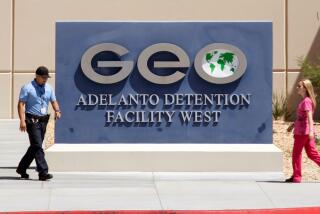COVID-19 cases leap in outbreak at ICE detention center in Adelanto

The Immigration and Customs Enforcement processing facility in Adelanto is in the grips of a COVID-19 outbreak, federal officials say. The confirmed case count more than doubled within a few days.
The trajectory of the outbreak is laid out in court documents filed Wednesday and Thursday.
From the start of the pandemic until Sunday, 14 people had tested positive for the coronavirus — all of them new detainees who tested positive upon arrival at the facility — Department of Justice lawyer Hans Chen said in an email to lawyers with the American Civil Liberties Union of Southern California.
Adelanto staff have routinely tested newly arriving detainees but not those already held at the facility unless they presented severe symptoms, including fever, advocates say.
But on Tuesday, new cases had emerged in two units at the facility. Staff then decided to place that entire wing of the facility under quarantine status and test all 120 detainees, said Gabriel Valdez, assistant field office director for ICE in Los Angeles.
By Thursday, 39 more people had tested positive. Staff are conducting contact tracing for all infected detainees, Valdez wrote in a declaration. He said it’s too soon to know the possible source of the infection.
Six detainees have been hospitalized for COVID-19 treatment, Valdez wrote. Adelanto doesn’t have access to rapid tests but is trying to obtain them, he said. Tests will be offered in stages to all detainees and facility staff. Employees who decline will be asked to quarantine for two weeks at home.
Adelanto is at 36% capacity, with 748 detainees.
“In a proactive response to the overall health, welfare and safety of detainees, management initiated voluntary testing of all detainees in affected housing units,” said Alexx Pons, a spokesperson for ICE. “Consistent with Centers for Disease Control and Prevention (CDC) guidelines, those who may have come in contact with these individuals have also been cohorted and are being monitored for symptoms.”
Reports began circulating among detainees and advocates late last week that multiple units in the facility were under quarantine, with many detainees experiencing COVID-19 symptoms and some staff members hospitalized. ACLU lawyers, who are leading a class-action lawsuit over conditions inside the facility during the pandemic, had asked lawyers for ICE to respond.
ACLU lawyers requested an emergency court order Wednesday asking ICE to immediately conduct rapid tests for all detainees and provide information about testing and medical response to the outbreak.
On Thursday, lawyers for ICE submitted a status report asking the court not to “micromanage” Adelanto’s response to the outbreak.
The lawyers wrote that ICE officals’ “response to recent developments at Adelanto reflect a rapid but deliberate approach to a developing situation that (is) the opposite of deliberate indifference or punitive detention.”
Margaret Hellerstein, a lawyer with the Esperanza Immigrant Rights Project, said some of her clients told medical staff at Adelanto that they had symptoms including cough, chills, sore throat, chest pain and fatigue.
“My clients were told that their illness was the result of poor air quality and that they should gargle with salt. They were finally tested on Tuesday after suffering for days,” she said.
One client, 23-year-old Marvin Cua from Guatemala, told her he felt so sick that he could barely keep his eyes open and feared that he could infect others in his unit. On Thursday, those fears were confirmed: He tested positive for the coronavirus.
California appears to be riding a wave of success beating back the coronavirus. But these signs of progress also bring concerns that it could be erased.
More than 5,800 people in ICE custody have tested positive for the coronavirus nationwide, according to the agency.
Earlier this year, the ACLU and the law firm Latham and Watkins filed a lawsuit against ICE, arguing that conditions at Adelanto made the facility vulnerable to an outbreak and seeking the mass release of those held there. In July, a U.S. District judge in Los Angeles allowed lawyers to start filing bail applications on behalf of detainees for potential release. Since then, Judge Terry Hatter has ordered 56 detainees to be released and denied five bail applications.
On Thursday, Hatter ordered a halt to any additional bail releases, citing his “reluctance to have any potentially COVID-19 positive detainee released into the community.”
Last month, ACLU lawyers discovered that 1,900 COVID-19 test kits had been shipped overnight to the Adelanto facility in May, but officials refused to allow the vast majority of them to be used, according to an email exchange released under the class-action lawsuit.
Facility staff planned to begin offering testing to all staff and detainees the day the test kits arrived.
But Valdez, the ICE officer in charge of Adelanto, said in an email May 23, “Until I receive guidance from my chain of command I don’t want any detainees tested through this voluntary process.”
Instead, ICE decided to test new arrivals but not people already held at the facility.
The state’s inspector general says screening and training problems may have contributed to the deadly outbreaks in California prisons.
A similar situation played out last month at the Mesa Verde facility in Bakersfield, when lawyers obtained emails showing that officials had rejected a suggestion to test all detainees there because it would be difficult to quarantine those who tested positive.
After half of the detainees at Mesa Verde tested positive, a federal judge in San Francisco ordered ICE to immediately test all detainees and staff, saying, “there’s no question that this outbreak could have been avoided.”
More to Read
Sign up for Essential California
The most important California stories and recommendations in your inbox every morning.
You may occasionally receive promotional content from the Los Angeles Times.













